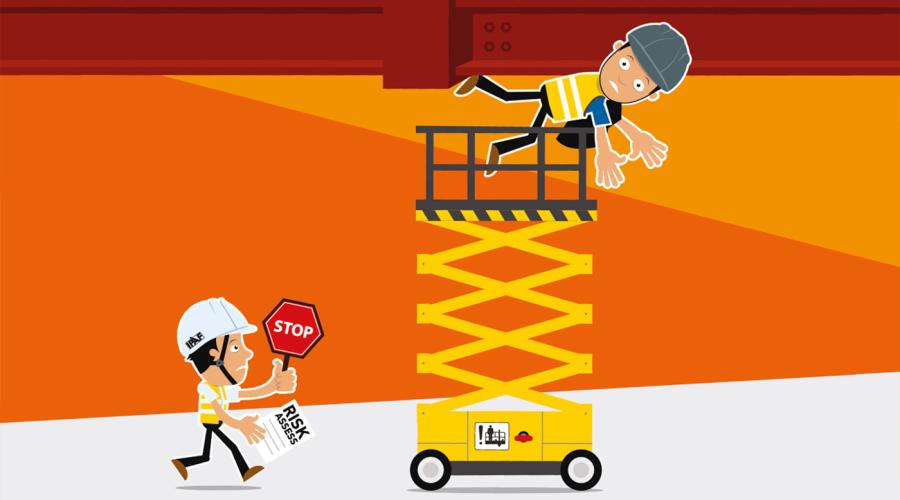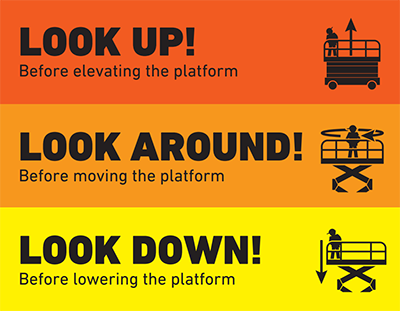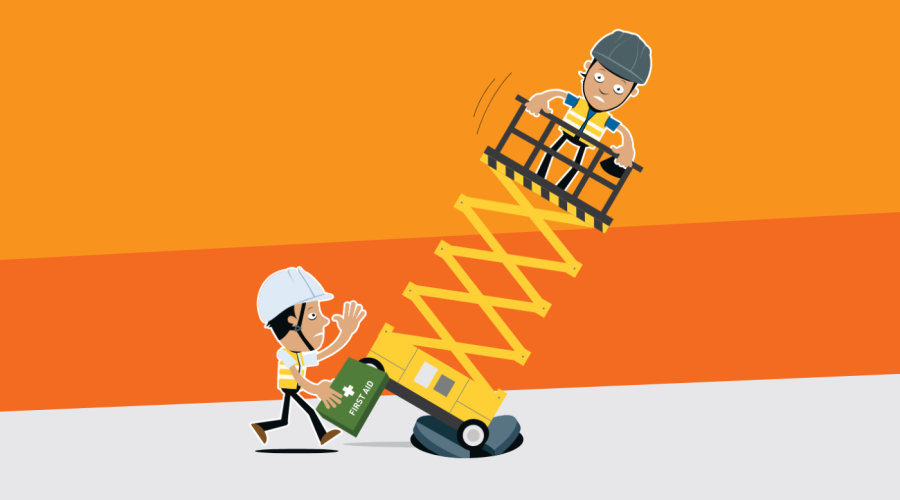Crushing can kill!

Resource also available in:
CRUSHING CAN KILL - STAY ALERT, STAY ALIVE
Mobile Elevating Work Platforms (MEWPs) are often used to carry out work in areas where there are risks of crushing or entrapment to the platform occupants.
Any activity involving MEWPs must be planned and properly managed. Failure to do so can result in injury or death of the platform occupants.
MEWP incidents involving entrapment and crushing increased from 35 in 2021, to 46 in 2022*
Hazards and risks
Crushing hazards include overhead structures such as beams, low ceilings, doorways and other machines and equipment operating in the area. If a platform occupant becomes trapped or crushed against an external structure there is risk of injury or death.
How to work safely
Planning stage - identify hazards and thereafter, produce a risk assessment and safe system of work (SSoW). The SSoW should be shared with all those involved; operators, platform occupants, ground staff and other personnel. Everyone should be trained and familiarised with the MEWP being used. A Rescue Plan must be shared so everyone knows what to do in the event of a crushing or entrapment situation, including how to safely lower the MEWP platform.
Operating stage - supervise to ensure the MEWP activity is conducted safely. If the nominated rescue person or any other personnel identifies a risk of crushing or entrapment, the activity should be stopped immediately and the MEWP platform safely lowered. Operators must not rely on secondary guarding (if fitted) and they and any other platform occupants must remain vigilant and aware of their surroundings.
Pedestrian Control Mode*
Some 3A and 1B (spider) type MEWPs are fitted with detachable platform controls for use of ‘Pedestrian Control’ mode. This is when the MEWP operator stands on the ground and walks alongside the MEWP operating it using the hand-held detachable platform controls. (Sometimes known as ‘wander leading’ or ‘dog walking’.) MEWPs without detachable platform controls must not be used for pedestrian control activities.
If pedestrian control is used to manoeuvre the MEWP to its intended position, careful planning will reduce risk of injury to operators and other personnel. The operator may be in close proximity to the MEWP when using pedestrian control mode and should maximise the ‘stand-off’ distance between themselves and the MEWP to minimise the risk of crushing.
*Pedestrian Control mode should only be used if overhead hazards are present and it is not possible to operate from the platform position.
Resources
- Good practice guidance for reducing trapping/crushing injuries to people in MEWPs
- Safe use of MEWPs when using pedestrian controls
- F1 Familiarisation leaflet
- Safe Loading and Unloading of MEWPs on the Public Highway
- Avoid Overhead Obstructions Toolbox Talk
- MEWP Rescue procedures Toolbox Talk
- MEWP Rescue Plan Toolbox Talk
- The Pedestrian Control Of MEWPs Toolbox Talk
- The Risks Of Operating MEWPs From The Ground Controls Toolbox Talk
- Andy Access: Danger Keep Well Clear
- Andy Access: Operating MEWPs From The Ground Controls
- Andy Access: Overhead Obstructions
- Andy Access: Platform Occupants
- Andy Access: Caution When Loading And Unloading
- Andy Access Short: Overhead Obstructions
Remember!
Entrapment or crushing can occur when MEWPs are in both the elevated and stowed positions.

* According to data collated via IPAF’s global accident portal. The accident portal is a global facility where incidents and accidents can be reported anonymously. Data is analysed annually for trends and used to inform training course content, improve existing guidance and identify messages of global safety campaigns. www.ipaf.org/accident
